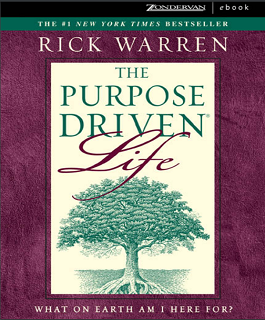eBooks
13 Books found- Featured

Power of Now
Authors: Ekhart tolle
📖 Brief Summary The Power of Now is a spiritual and practical guide that teaches how to live fully in the present moment. Tolle explains that most human suffering comes from being trapped in past regrets or future anxieties, while true peace and happiness exist only in the Now. Key ideas include: Ego & the Mind: The mind often creates false stories that keep us restless and unhappy. Presence: By focusing on the present, we find freedom from worry and inner peace. Pain-Body: Emotional baggage feeds on negative thoughts, but awareness dissolves it. Enlightenment in Daily Life: You don’t need to escape to a mountain or monastery—awakening happens in simple awareness of everyday moments.
- Featured
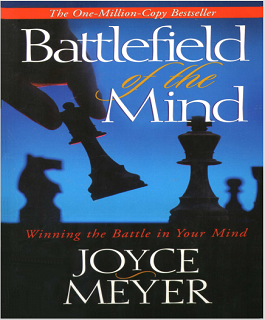
Battle Field of the mind
Authors: Joyce meyer
“If you’ve ever felt like your thoughts were out of control, this book will show you how to take them captive—and win the battle for your peace, purpose, and joy.”
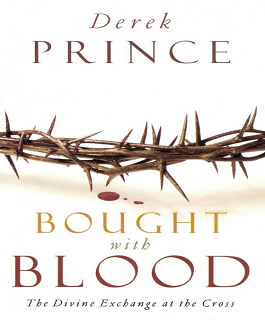
Bought with the blood
Authors: Derek Prince
CHAPTER 1 One All-Sufficient Sacrifice A single theme runs throughout this book: atonement. This word is comparatively rare in contemporary English. In fact, many English-speaking people today do not even know what the word means. Its meaning begins to appear, however, when we divide the word up into its three syllables: at-one-ment. That is what atonement really means—that God and the sinner are brought into a relationship in which they are atone. A more common word today is reconciliation. Through the cross God and the sinner are reconciled to each other. There is a vitally important difference between the word translated atonement in the Hebrew of the Old Testament and the word translated atonement in the Greek of the New Testament. In Hebrew the word is kippur and means "covering." The Day of Atonement was a day of covering. By the sacrifices offered on that day, the sins of the people were covered— but only for one year. The next year at the same time, their sins had to be covered once more. The sacrifices offered that day provided no permanent solution, therefore, to the problem of sin; they merely provided a temporary covering. On each successive Day of Atonement, that covering was extended for one more year. The picture of atonement in the New Testament is totally different. We see this when we contrast two passages in Hebrews—the book that deals, above all others, with Jesus as our High Priest and with the sacrifice He made on our behalf. First, Hebrews 10:3-4 speaks of the sacrifices of the Old Testament: "In those sacrifices there is a reminder of sins every year." So, far from taking sin away, those sacrifices reminded the people of the problem of sin. "For it is not possible," the writer continues, "that the blood of bulls and goats could take away sins." The central issue here is taking away sins, not merely covering them. In Hebrews 9:26, on the other hand, the writer speaks about what was accomplished by the death of Jesus, in direct contrast to the Old Testament sacrifices. In the second half of that verse, speaking of Jesus, the writer says: "But now, once at the end of the ages, He has appeared to put away sin by the sacrifice of Himself." So when Jesus came and offered Himself as a sacrifice on the cross, He put away sin. This action contrasts with the Old Testament sacrifices, which merely reminded people of the fact that sin had not been dealt with and provided a covering that was valid for only one year. When John the Baptist introduced Jesus in John 1:29, therefore, he said, "Behold! The Lamb of God who takes away the sin of the world!" Notice once again how different this is from the Old Testament. Jesus took away sin. For that reason, for those who have accepted His sacrifice, there remains no further sacrifice for sins
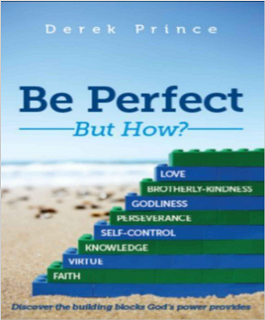
Be perfect --but how
Authors: Derek Prince
INTRODUCTION One of the simplest commandments Jesus ever gave can be stated in two words, “Be perfect.” This command is simple in number of words but certainly not so simple to carry out—just two direct words, “Be perfect.” In addition, Jesus didn’t say try to be perfect, He said be perfect. He never told us to t r y to obey any of His commandments. He never said try to love your enemies; He said love your enemies. Why? Because He knew if we were to rely on our own ability to be perfect, we might as well give up in frustration and failure. It is impossible
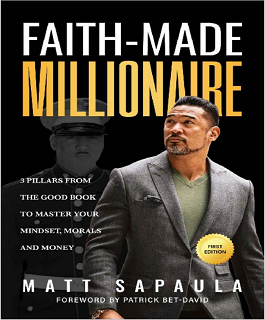
Faith-Made Millionaire
Authors: Matt Sapaula
In Business and Finance, Economics, Spiritual-Faith
PILLAR I FAITH & FAMILY “The greatest legacy one can pass on to one’s children, and grandchildren is not money or other material things accumulated in one’s life, but rather a legacy of character and faith.” — Billy Graham E 1 Misconceptions of Faith “Faith is to believe what you do not see. The reward of faith is to see what you believe.” — Saint Augustine very human being lives by faith. Even someone who doesn’t believe in a God or a Higher Power believes in science. They put their trust in hypotheses advanced by non-religious scientists with regard to the origin of the universe and questions of ultimate meaning. Since these are things they cannot scientifically verify, they essentially learned from others they consider authoritative. Hebrews, chapter eleven in the Bible has often been called “The Faith Chapter.” It describes many of God’s greatest servants and how their faith enabled them to perform great acts and miracles and endure severe trials. This chapter says, “Now faith is the substance of things hoped for, the evidence of things not seen” (Hebrews 11:1, emphasis added). Faith involves evidence of things not seen, but how can evidence be related to something unseen since evidence usually involves tangible things? In a courtroom, evidence involves facts—and anything that isn’t seen—is hearsay. Faith involves assurance of things we hope for, but if something is hoped for, that means it hasn’t been received yet. Therefore, where faith is involved, there is an assurance that it will be received! Authentic faith, in any of God’s promises, is actually the evidence. If God promises to do something, it is impossible for Him to lie (Hebrews 6:18). Faith, by its very nature, produces action. We are wired to feel and act in accordance with what we believe to be true. We cannot help it. Faith is knowing what needs to be done without feeling prepared to make a decision. You don’t have the skills or know what the end result will be, but you know there’s a Higher Power that is seeing things through. For years, I misunderstood faith. I used my faith in God as armor or insurance policy because I was either scared or looking for another layer of protection like I did in the military. I wanted eternal security just in case something happened to me. I convinced myself that I was pleasing God, while in fact, God wanted me to use faith in my everyday life, not when I was about to cross into eternity. If beliefs about God and faith abound, then misguided misconceptions about faith in Him also exist. I won’t attempt to dispel every misconception about faith because that would take too long. I will share, however, some of the most common false beliefs we can hold regarding faith. Misconception: God isn’t concerned about money. Truth: God cares about you and your money. Some people believe God cares more about their heart and spirit versus what they do with their money. He actually cares about both. Half of Jesus’ parables instruct people on how to handle earthly treasures. One out of ten verses in the four gospels deals with money and stewardship. Are you convinced yet? God taught more about stewardship than about Heaven and Hell combined! Why in the world would God spend so much time on this topic if it wasn’t necessary? Money is a training ground for God to develop (and for us to discover) our trustworthiness. “If therefore you have not been faithful in the use of unrighteous mammon, who will entrust the true riches to you?” (Luke 16:11). Billy Graham once said, “You tell me what you think about money, and I will tell you what you think about God.” If you look at your checkbook or financial records, you will see where your heart is. Money reveals the condition of our hearts, and how we deal with it shows how much we give over to our Lord versus how much we hold back.
- Featured
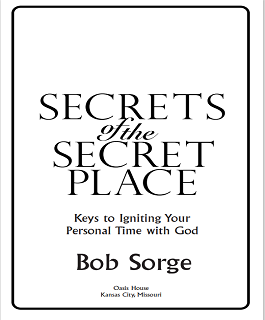
Secret of The Secret place
Authors: Bob Sorge
“But you, when you pray, go into your room, and when you have shut your door, pray to your Father who is in the secret place; and your Father who sees in secret will reward you openly” (Matthew 6:6). J esus Himself spoke these blessed words. All Scripture is God-breathed, but followers of Jesus always find special delight in giving particular attention the words Jesus Himself gave us. When Jesus taught on prayer, He gave primary emphasis to the secret place. In fact, the first thing He taught concerning prayer was the primacy of the secret place. In the verses following, He would teach us how to pray, but first He teaches where to pray. Matthew 6:6 contains a powerful secret regarding the where of prayer, but before I share it let me ask a question. Do you struggle frequently with feeling disconnected from God? Do you strain to feel God’s presence when you pray? Does He seem distant to you? Do you long to know that He is with you, right now, drawing near to you?
- Featured
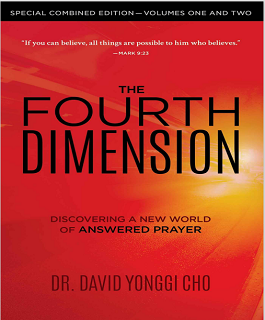
The Fourth Dimension
Authors: Dr. David Yongi Cho
ncubation: A Law of Faith God will never bring about any of His great works without coming through your own personal faith. It is taken for granted that you have faith, for the Bible says that God has dealt to each and every one of us a measure of faith. You have faith whether you feel it or not. You may try to feel faith, but when you need faith, then faith is there. It is there for your use, like having two arms; when you need to use them, you just reach out your arms and move them. I do not need to feel that my two arms are hanging on my shoulders to know that I have them. There are, however, certain ways your faith works, and links you to the Heavenly Father who dwells within you. The Bible says that faith is the substance of things hoped for, a substance which first has a stage of development—of incubation—before its usage can be full and effective. You might now ask, “What are the elements needed to make my faith usable?” There are four basic steps to the process of incubation.
- Featured
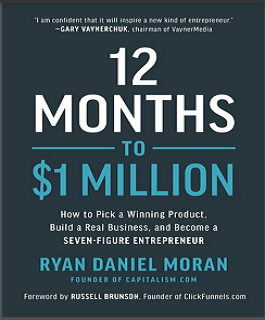
12 Months to $1 Million
Authors: Russel Brussen
Y FOREWORD ou’re one funnel away.” These words are my promise to entrepreneurs. My name is Russell Brunson, and I lead a community of entrepreneurs who build simple and profitable businesses. We call ourselves “funnel hackers.” I have personally seen thousands of women and men create businesses with nothing more than an idea and a drive to succeed. To date, we have more than 600 community members in our “two-comma club”—individuals who sold at least a million dollars on our software platform, ClickFunnels. None of us come with silver spoons in our mouths. We don’t have big teams, and we don’t cheat by raising money from venture capital firms; if anyone does invest in us, it is usually a few thousand dollars from someone who believed in our crazy dreams. We don’t begin with unique skills or previous experience. We don’t come from families of business moguls. We are simply passionate business builders who can’t do anything except be entrepreneurs. Why? Because above else, we desire freedom. We desire the freedom to give more to our families, our communities, and our churches, and we desire to leave the world better than how we found it. We desire the freedom to give our kids the advantages that we did not have. We desire the freedom to see the world and live life on our own terms. I believe that every person is one funnel, one idea, or one breakthrough away from their version of freedom. You are one funnel away from the life that you want.

